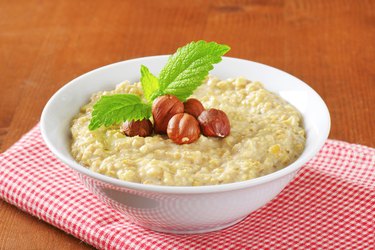
Often referred to as heartburn, acid reflux is a burning sensation in the chest that occurs when stomach contents back up into the esophagus. While acid reflux may limit what foods can be tolerated, whole grain and fiber-rich oatmeal may benefit people with these symptoms. Include healthful foods such as oatmeal to maintain a nutritious diet in a food plan that may otherwise be limited.
Fiber
Video of the Day
Oatmeal is not a common trigger food in people with acid reflux, and in general, incorporating high fiber foods such as oatmeal may help prevent symptoms. Research published in the January 2005 issue of "Gut" linked a high fiber intake to a reduced risk of acid reflux symptoms. Fiber promotes intestinal health, reduces constipation and helps the body feel full for a longer period of time after eating. The contents of a full stomach are more likely to regurgitate into the esophagus, so eating more fiber may help curb portions and help prevent acid reflux.
Video of the Day
Whole Grains
Whole grains continue to serve as an important part of any diet. Oats, in particular, have been linked to a decreased risk of cardiovascular disease, diabetes and potentially cancer, according to a review article published in the October 2014 "British Journal of Nutrition." The American College of Gastroenterology's 2013 clinical guidelines recommend weight loss as a prevention tool for reduction of acid reflux symptoms. A review article published in the May 2012 "Journal of Nutrition" concluded that an increase in whole grain intake resulted in a lower risk of weight gain, making whole grain foods such as oatmeal seemingly ideal for anyone on a weight loss plan.
Potential Problems
Although the American College of Gastroenterology's clinical guidelines do not recommend or restrict specific foods in acid reflux management, certain foods have the potential to worsen symptoms. For example, symptoms could occur after eating high fat breakfast foods such as bacon, sausage or oily hash browns, or after drinking coffee or orange juice. If oatmeal was also part of the meal, it could take time and experimentation to understand the real cause of the symptoms. Eating a large breakfast or lying down within two to three hours after eating may also aggravate acid reflux. Pay attention to symptoms and keep a log of foods eaten to help determine if certain foods worsen acid reflux.
Precautions and Next Steps
Acid reflux is usually managed with a combination of medications, and lifestyle and dietary modifications. The American College of Gastroenterology recommends people with acid reflux only eliminate foods that worsen symptoms -- so as long as oatmeal is tolerated, this low-fat and fiber-rich food may be a valuable addition to the diet. A doctor should be consulted if symptoms are frequent or become more severe, as this could be an indication of gastroesophageal reflux disease, which can lead to more serious health problems. In addition, a registered dietitian nutritionist can help individualize a overall healthy eating plan while taking health history and food tolerances into account.
- Gut: Dietary Intake and the Risk of Gastro-Oesophageal Reflux Disease: A Cross Sectional Study in Volunteers
- British Journal of Nutrition: The Future of Oats in the Food and Health Continuum
- American College of Gastroenterology: Diagnosis and Management of Gastroesophageal Reflux Disease
- Journal of Nutrition: Greater Whole-Grain Intake Is Associated with Lower Risk of Type 2 Diabetes, Cardiovascular Disease, and Weight Gain
- Whole Grains Council: Types of Oats
- The Academy of Nutrition and Dietetics: Easy Ways to Boost Fiber in Your Daily Diet
Is this an emergency? If you are experiencing serious medical symptoms, please see the National Library of Medicine’s list of signs you need emergency medical attention or call 911.